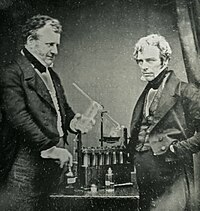
Photo from wikipedia
The molecular structures synthesizable by organic chemists dictate the molecular functions they can create. The invention and development of chemical reactions are thus critical for chemists to access new and… Click to show full abstract
The molecular structures synthesizable by organic chemists dictate the molecular functions they can create. The invention and development of chemical reactions are thus critical for chemists to access new and desirable functional molecules in all disciplines of organic chemistry. This work seeks to expedite the exploration of emerging areas of organic chemistry by devising a machine-learning-guided workflow for reaction discovery. Specifically, this study uses machine learning to predict competent electrochemical reactions. To this end, we first develop a molecular representation that enables the production of general models with limited training data. Next, we employ automated experimentation to test a large number of electrochemical reactions. These reactions are categorized as competent or incompetent mixtures, and a classification model was trained to predict reaction competency. This model is used to screen 38,865 potential reactions in silico, and the predictions are used to identify a number of reactions of synthetic or mechanistic interest, 80% of which are found to be competent. Additionally, we provide the predictions for the 38,865-member set in the hope of accelerating the development of this field. We envision that adopting a workflow such as this could enable the rapid development of many fields of chemistry.
Journal Title: Journal of the American Chemical Society
Year Published: 2022
Link to full text (if available)
Share on Social Media: Sign Up to like & get
recommendations!